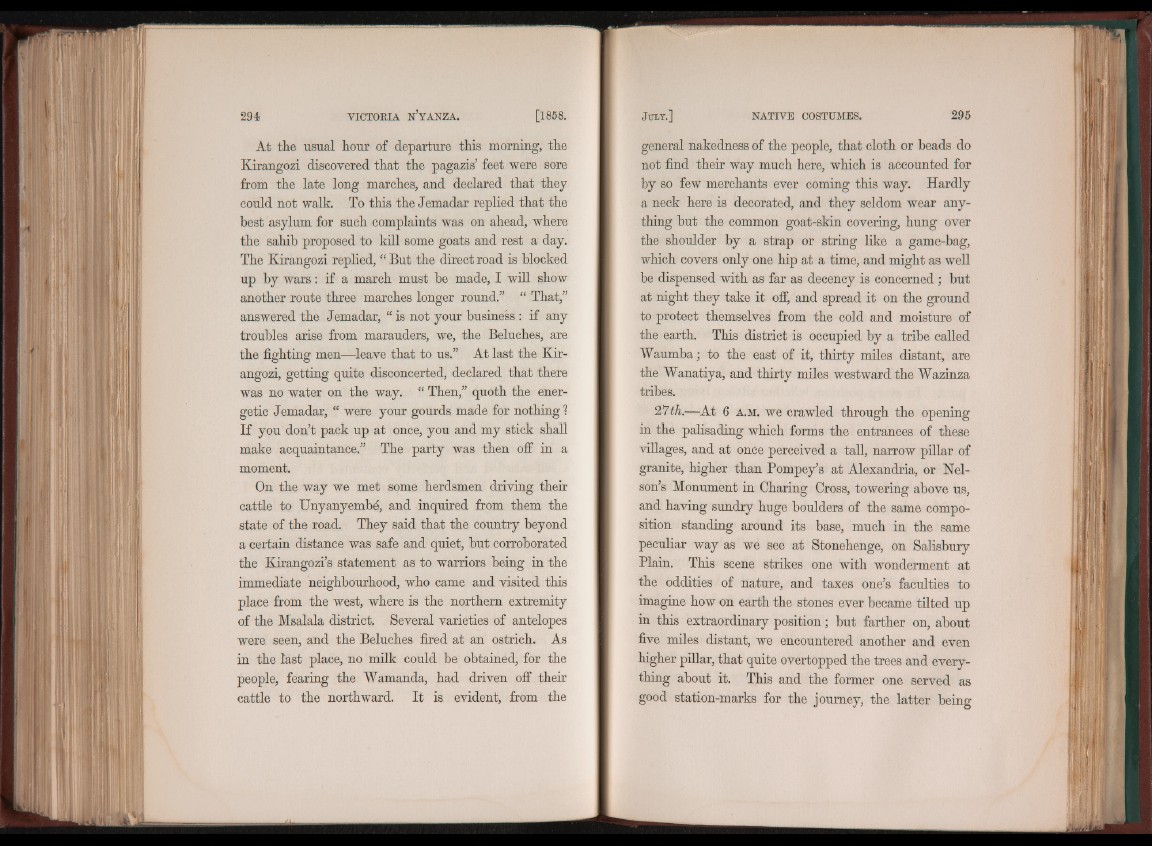
At the usual liour of departure this morning, the
Kirangozi discovered that the pagazis’ feet were sore
from the late long marches, and declared that they
could not walk. To this the Jemadar replied that the
best asylum for such complaints was on ahead, where
the sahib proposed to kill some goats and rest a day.
The Kirangozi replied, “ But the direct road is blocked
up by wars: if a march must be made, I will show
another route three marches longer round.” “ That,”
answered the Jemadar, “ is not your business : if any
troubles arise from marauders, we, the Beluches, are
the fighting men—leave that to us.” At last the Kirangozi,
getting quite disconcerted, declared that there
was no water on the way. “ Then,” quoth the energetic
Jemadar, “ were your gourds made for nothing ?
If you don’t pack up at once, you and my stick shall
make acquaintance.” The party was then off in a
moment.
On the way we met some herdsmen driving their
cattle to Unyanyembd, and inquired from them the
state of the road. They said that the country beyond
a certain distance was safe and quiet, but corroborated
the Kirangozi’s statement as to warriors being in the
immp.dia.t,R neighbourhood, who came and visited this
place from the west, where is the northern extremity
of the Msalala district. Several varieties of antelopes
were seen, and the Beluches fired at an ostrich. As
in the last place, no milk could be obtained, for the
people, fearing the Wamanda, had driven off their
cattle to the northward. It is evident, from the
general nakedness of the people, that cloth or beads do
not find their way much here, which is accounted for
by so few merchants ever coming this way. Hardly
a neck here is decorated, and they seldom wear anything
but the common goat-skin covering, hung over
the shoulder by a strap or string like a game-bag,
which covers only one hip at a time, and might as well
be dispensed with as far as decency is concerned ; but
at night they take it off, and spread it on the ground
to protect themselves from the cold and moisture of
the earth. This district is occupied by a tribe called
Waumba ; to the east of it, thirty miles distant, are
the Wanatiya, and thirty miles westward the Wazinza
tribes.
27th.—At 6 a .m. we crawled through the opening
in the palisading which forms the entrances of these
villages, and at once perceived a tall, narrow pillar of
granite, higher than Pompey’s at Alexandria, or Nelson’s
Monument in Charing Cross, towering above us,
and having sundry huge boulders of the same composition
standing around its base, much in the same
peculiar way as we see at Stonehenge, on Salisbury
Plain. This scene strikes one with wonderment at
the oddities of nature, and taxes one’s faculties to
imagine how on earth the stones ever became tilted up
in this extraordinary position ; but farther on, about
five miles distant, we encountered another and even
higher pillar, that quite overtopped the trees and everything
about it. This and the former one served as
good station-marks for the journey, the latter being